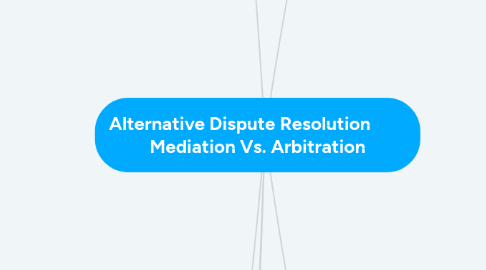
1. Mediation Advantages
1.1. Timely and Convient
1.1.1. Mediation does not take weeks or months, it can be scheduled in a matter of days
1.1.2. Escalations of conflict can be prevented as well as unnecessary delays in finding resolutions that are mutually agreeable.
1.2. Helps Preserve ongoing relationships
1.2.1. Negotiated solutions through mediation agreements address each parties needs
1.2.2. Mediation is a win/win siutation for each party and both parties are still able to preserve their present and future working relationship
1.3. Voluntary
1.3.1. Parties choose if they want to participate, because the potential outcome is usually a better settlement.
1.3.2. If an agreement cannot be met other grievance options are available to the parties, including pursuing appropriate legal options or filing a formal grievance.
1.3.3. Cannot be forced into effective brainstorming to find new options. No one is forced or coerced into using this procedure.
2. Mediation Disadvantages
2.1. Complete Truth not Revealed
2.1.1. As in a court case where attorneys have the ability to call witnesses and procure evidence, with mediation this is not avalible.
2.1.2. Courts are set up so that both parties are treated fairly, but in some certain circumstances this is hard to achieve with mediation
2.2. No Formal Rules
2.2.1. If a skilled mediator is not employed with the company the lack of formal rules can often result in an impasse.
2.2.2. Cooperation of both parties is relied upon in mediation
2.2.3. Entire process could end in failure if the parties involved cant come to a compromise.
2.3. unfair settlement
2.3.1. Making sure that a settlement is fair to both parties can be a difficult accomplishment and is one of the biggest disadvantages of mediation.
2.3.2. One party may be more savvy to the mediation process or has access to more resources.
2.3.3. Could get the other party to agree to a settlement not in their best interest.
3. Summary of 5 Mediator Qualifications
4. Court-Certified mediators in the US are required to usually have between 20-40 hours of approved mediation training.
5. Arbitration Advantages
5.1. Timeliness
5.1.1. Arbitration is much quicker than waiting for a trial date.
5.1.2. Scheduling is more flexible
5.1.3. Arbitration is less formal, and the discovery process is a simple phone call
5.2. Fairness
5.2.1. Both parties agree to the arbitrator
5.2.2. Parties agree to choose an arbitrator that has experience in their specific area of legal dispute.
5.3. Cost
5.3.1. Legal preparation and expert witnesses are not required thru arbitration.
5.3.2. Both parties split the cost of the arbitrator meaning that the process is much cheaper.
6. Arbitration Disadvantages
6.1. No Appeals
6.1.1. Decisions with arbitration are final.
6.1.2. No formal appeals process available. Even if one party feels that the outcome was unjust, unfair, or biased they cannot appeal it.
6.2. Lack of Consistency
6.2.1. It is often difficult to find consistency because there are no set standards for arbitration.
6.2.2. With mandatory arbitration contracts, it is sometimes possible that an arbitrator can be biased.
6.3. Cost
6.3.1. When minimal money is involved, arbitration generally is a more cost-efficient legal settlement option.
